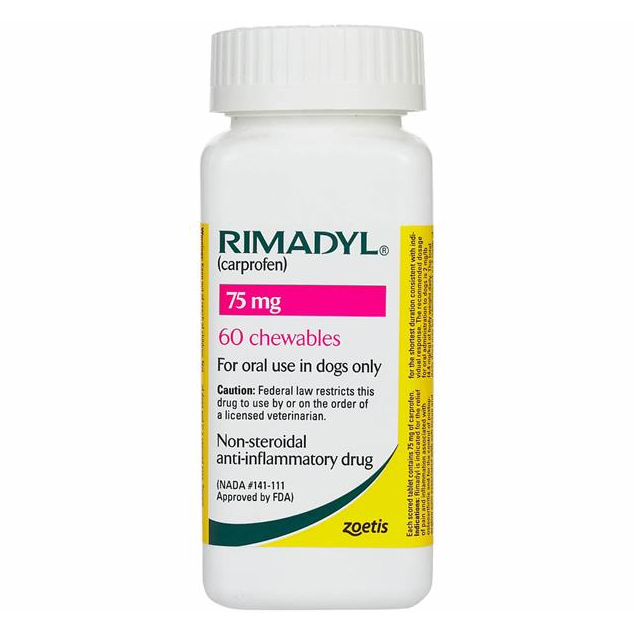
Rimadyl (Carprofen) Chewable Tablets for Dogs, 75 mg, 60 count
This product requires a prescription
1. We’ll ask for your vet’s info during checkout.
2. We’ll verify your prescription and ship your order.
Details and state availability.
RIMADYL (Carprofen) for dogs is a nonsteroidal anti-inflammatory drug (NSAID) approved for once- or twice-daily dosing to relieve the pain and inflammation in the joints of dogs with osteoarthritis. It comes in easy-to-use caplets and tasty chewables. After just 2 weeks of taking RIMADYL at label dose, dogs had visible improvements in energy, happiness, activity level, comfort, and calmness.
RIMADYL works by blocking the production of certain body chemicals that cause inflammation. Its efficacy in treating osteoarthritis makes it a trusted long-term treatment, as well as for short-term use after surgery. The nonsteroidal anti-inflammatory properties work to reduce joint inflammation while the analgesic properties work to reduce pain.
Our pharmacists are available for counseling regarding prescriptions purchased from Pet Supplies Delivered before and after dispensing. Monday - Friday, 9 AM - 2 PM CST. 1-800-367-4444.
Carprofen
Your veterinarian will prescribe a dosage and treatment plan based on your dog’s weight and the cause of their pain.
FAQs for Rimadyl
1. What is Rimadyl?
Rimadyl is a brand name for the drug carprofen, which is a nonsteroidal anti-inflammatory drug (NSAID) used to alleviate pain and inflammation in dogs. It is commonly prescribed by veterinarians to manage osteoarthritis and postoperative pain in canines.
2. How does Rimadyl work?
Rimadyl works by inhibiting the production of certain enzymes called prostaglandins that are responsible for pain and inflammation. By reducing these chemicals, the drug helps to relieve pain and improve mobility in dogs with joint-related issues.
3. Is Rimadyl safe for my dog?
Rimadyl is generally safe when prescribed by a veterinarian and administered at the proper dosage. However, like all medications, it can have potential side effects. It's crucial to follow your vet's instructions and inform them of any preexisting health conditions your dog may have.
4. What conditions can Rimadyl treat in dogs?
Rimadyl is primarily used to manage pain and inflammation associated with osteoarthritis, as well as postoperative pain following surgical procedures in dogs.
5. Is Rimadyl suitable for all dog breeds and sizes?
Rimadyl is generally safe for most dog breeds and sizes, but the dosage may vary based on the dog's weight and health condition. Always consult your veterinarian to determine the appropriate dose for your dog.
6. How is Rimadyl administered to dogs?
Rimadyl is available in various forms, including chewable tablets, caplets, and injectable solutions. The tablets or caplets are usually given orally with or without food, depending on your veterinarian's recommendation.
7. Can Rimadyl be given with other medications?
It's essential to inform your veterinarian about any other medications or supplements your dog is taking to avoid potential drug interactions. Rimadyl should not be combined with other NSAIDs or corticosteroids without veterinary approval.
8. Are there any side effects associated with Rimadyl use?
While Rimadyl is generally well-tolerated, some dogs may experience side effects such as vomiting, diarrhea, loss of appetite, or changes in behavior. In rare cases, more severe adverse reactions like liver or kidney problems may occur. Contact your veterinarian immediately if you notice any concerning symptoms.
9. Can Rimadyl be used for long-term treatment?
Rimadyl can be used for long-term management of chronic conditions like osteoarthritis, but its use should be closely monitored by a veterinarian. Regular check-ups and blood tests may be recommended to ensure your dog's safety.
10. What should I do if my dog accidentally overdoses on Rimadyl?
If you suspect your dog has ingested more Rimadyl than prescribed or is showing signs of an overdose (such as vomiting, diarrhea, or lethargy), seek immediate veterinary attention. An overdose of Rimadyl can be dangerous and requires prompt medical intervention.
11. Can Rimadyl be used in cats or other animals?
No, Rimadyl is specifically formulated for dogs and should never be used in cats or other animals. Cats can be particularly sensitive to NSAIDs, and using Rimadyl in cats can be life-threatening. Always use medications designed specifically for the species and follow your veterinarian's guidance.











